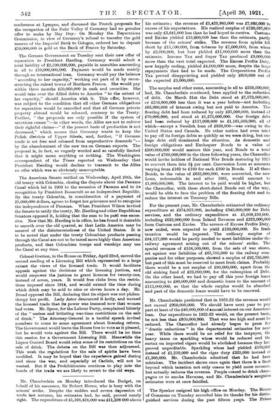Colonel Gretton, in the House on Friday, April 22nd, moved
the second reading of a Licensing Bill which represented to a large extent the views of the licensed trade. It would facilitate appeals against the decisions of the licensing justices, and would empower the justices to grant licences for twenty-one, instead of seven, years. It would free clubs from the reetric- tions imposed since 1914, and would extend the time during which drink may be sold to nine or eleven hours a day. Mr. Broad opposed the Bill, declaring that its object was not philan- thropy but profit. Lady Astor denounced it hotly, and warned the licensed trade that its power was lessened now that women had votes. Mr. Spoor, for the Labour Party, complained bitterly of the " useless and irritating war-time restrictions on the sale of drink." The Attorney-General in a tactful speech invited members to come to some agreement about licensing reform. The Government would leave the House free to vote as it pleased, but he would vote against the Bill. There would be no time this session for a Government Licensing Bill. Meanwhile the Liquor Control Board would relax some of its restrictions on the sale of drink. The debate on the Bill was then adjourned. This week the regulations for the sal. of spirits have been modified. It may be hoped that the experience gained during and since the war, and .especially at Carlisle, will not be wasted. But if the Prohibitionists continue to play into the hands of the trade we are likely to revert to the old ways.


































 Previous page
Previous page